Patients at the end of their lives are being let down by a care system in crisis, a stark report warns today.
One in three people spent their last week in “severe or overwhelming” pain, according to the largest survey on the topic in a decade.
Problems accessing appropriate care mean patients often “die in distress and alone”, the UK’s leading end-of-life charity added.
Marie Curie added that the stark findings showed a care system “in crisis” at a time when patients desperately needed support.
Nearly 1,200 relatives who had recorded the death of a loved one in the previous six to ten months were surveyed and the results analysed by the University of Cambridge, King’s College London and Hull York Medical School.
One in three spent their last week in “severe or overwhelming” pain, the report found (file image)

The report revealed that one in five had no contact with their family doctor in the past three months (file image)
Questions included whether there were services that were difficult to access or whether patients had the help they needed from GPs, community nurses, hospital doctors and nurses or a palliative care team.
The responses revealed huge gaps: one in five had had no contact with their family doctor in the past three months. Nearly half said their dying loved one had visited the emergency department at least once during this period, most often to ask for painkillers.
Marie Curie said this is proof that “too many people close to death end up in busy emergency rooms because they do not have access to adequate care at home or in a nursing home.”
Half of those surveyed said they were dissatisfied with at least one aspect of the care their dying person received. Of these, one in eight made a formal complaint.
Professor Katherine Sleeman, lead researcher at King’s, said: ‘This study reveals patchy and inconsistent healthcare delivery.
‘While there were examples of excellent care, the overall picture is that services are overstretched and health and care staff lack the time needed to consistently deliver high-quality care.’
Matthew Reed, chief executive of Marie Curie, said the results painted a “shocking” picture of disappointed patients and their families.
He added: “The inevitable consequence of this is that people are dying alone and in distress at home, in nursing homes and in hospitals. It is not enough.”
Dr Adrian Boyle, director of the Royal College of Emergency Medicine, said: “It can be heartbreaking to see people nearing the end of their lives having to seek help or pain relief in emergency departments. They are not always the most appropriate place. They reflect a failure of the system.”
The Department of Health and Social Care said it was facing “huge challenges” in the palliative care sector and ministers had met with NHS England to discuss access and quality of end-of-life care.

